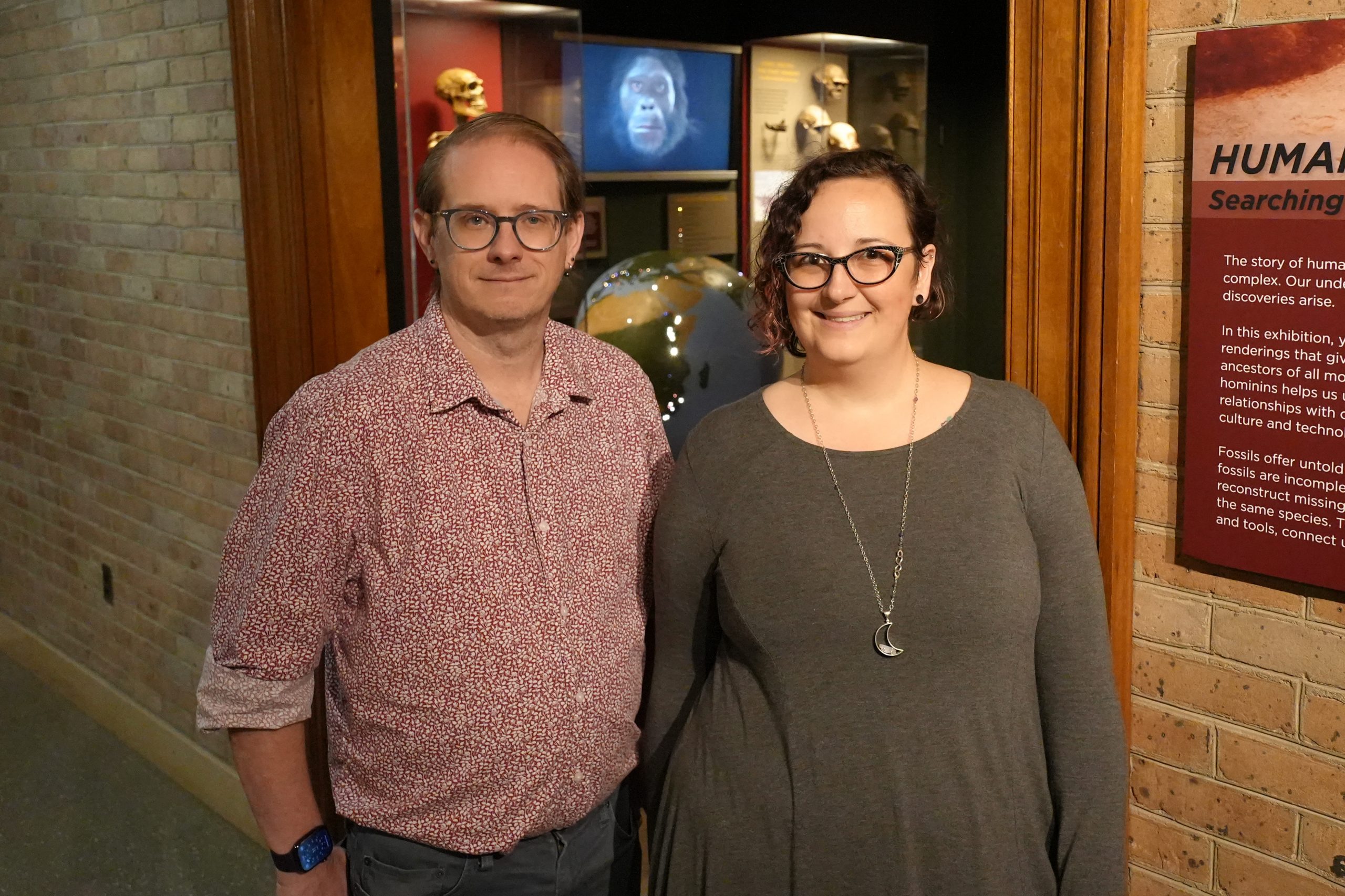Student-Faculty Collaboration Refreshes McClung Exhibit

Anthropology student and professor collaborate to update long-standing McClung exhibit on human origins.
The university celebrated the Scopes Trial Centennial throughout 2025 with numerous public activities that addressed a variety of topics related to the historic Tennessee trial and the science of evolution. As official events rolled along, one honors anthropology student and her faculty mentor quietly finalized a project to update the McClung Museum’s permanent exhibition on Human Origins, a long-standing interpretive point for natural history on campus.
Mae Manis, then an undergraduate and now a master’s student and graduate teaching assistant, took on the update as an honors project with mentorship from anthropology Assistant Professor Steven Lautzenheiser. The exhibit, originally designed and opened in the early 1990s, needed a refresh: updated language for the gallery’s descriptive texts and added context for visual elements that help tell the story of human ancestors.
“Mae’s honors project was twofold—to help with this redesign and also to understand how the space is used,” said Lautzenheiser. “This was a perfect example of a project that really fit into what Mae was capable of doing.”
Manis jumped at the opportunity to contribute to the exhibit—one of her favorites at the McClung, where she has enjoyed visits with her young son.
“I absolutely adore that room and all that it can offer,” she said. “What I brought to the project was a view from the student’s, museum patron’s, and mom’s perspective. Knowing how I have used that room influenced my desire to be a part of this project and drove my approach.”
Collaboration and Mentoring
They collaborated on thoughtful museum curation and the presentation of research in a public space: balancing scientific rigor with public education and accessibility while updating the exhibit’s educational story of human origins in line with the latest anthropological research. The long-standing, small-but-significant exhibit offers a cornerstone to the museum’s ongoing presentation of humanity’s role in the natural world.
“The McClung is important because it’s the closest natural history museum within the region,” said Lautzenheiser. “For many visitors, this is the only natural history museum they’ll ever go to.”
In addition to updating the exhibit for the benefit of visitors, he also saw the project as an opportunity to help Manis gain meaningful research experience.
“My job as a mentor is to maintain the scope of things, but at the same time to really try to foster her to push those boundaries and limits,” he said.
Manis appreciated the chance to go beyond the classroom and make a contribution to UT’s campus as part of her honors program.
“Working with Professor Lautzenheiser helped me to become more comfortable pursuing my goals and dreams academically,” she said. “It can be difficult to know where you fit within academia and how to reach your goals. I feel many undergraduate students never get the chance to step out and work with faculty—which can be such a huge help in finding your space and interests.”
Bolstering Public Science and Education
Manis sees a tremendous value in exhibits like this that share research and scientific knowledge with the public.
“I feel it is a valuable part of building strong communities and societies,” said Manis. “We need to see knowledge expanding and changing. It benefits us in so many ways: from helping us to stay more flexible and adaptable in our thinking—and more able to allow ourselves and others to change.”
The McClung is also a space frequently visited by school groups, where the next generation of scientists can be inspired by the possibilities of natural history and research. Manis has first-hand experience with mentoring her own future researcher.
“Outside of being a student, I’m also a mom to an awesome kid who wants to be a scientist when he grows up,” said Manis. “That makes it all the more important to me that he gets to see science and research in the public spheres.”
By Randall Brown